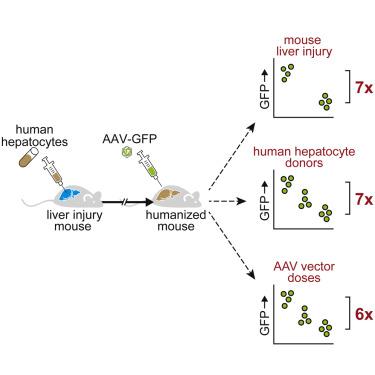Molecular Therapy - Methods & Clinical Development ( IF 4.6 ) Pub Date : 2020-06-02 , DOI: 10.1016/j.omtm.2020.05.033 Chenhui Zou 1, 2 , Koen O A Vercauteren 2, 3 , Eleftherios Michailidis 2 , Mohammad Kabbani 2 , Irene Zoluthkin 4 , Corrine Quirk 2 , Luis Chiriboga 5 , Mustafa Yazicioglu 6 , Xavier M Anguela 6 , Philip Meuleman 3 , Katherine A High 6 , Roland W Herzog 7, 8 , Ype P de Jong 1, 2

|
Adeno-associated virus (AAV) vector serotypes vary in their ability to transduce hepatocytes from different species. Chimeric mouse models harboring human hepatocytes have shown translational promise for liver-directed gene therapies. However, many variables that influence human hepatocyte transduction and transgene expression in such models remain poorly defined. Here, we aimed to test whether three experimental conditions influence AAV transgene expression in immunodeficient, fumaryl-acetoactetate-hydrolase-deficient (Fah−/−) chimeric mice repopulated with primary human hepatocytes. We examined the effects of the murine liver injury cycle, human donor variability, and vector doses on hepatocyte transduction with various AAV serotypes expressing a green fluorescent protein (GFP). We determined that the timing of AAV vector challenge in the liver injury cycle resulted in up to 7-fold differences in the percentage of GFP expressing human hepatocytes. The GFP+ hepatocyte frequency varied 7-fold between human donors without, however, changing the relative transduction efficiency between serotypes for an individual donor. There was also a clear relationship between AAV vector doses and human hepatocyte transduction and transgene expression. We conclude that several experimental variables substantially affect human hepatocyte transduction in the Fah−/− chimera model, attention to which may improve reproducibility between findings from different laboratories.
中文翻译:

影响肝嵌合小鼠中人肝细胞 AAV 转导的实验变量。
腺相关病毒 (AAV) 载体血清型转导不同物种肝细胞的能力各不相同。含有人类肝细胞的嵌合小鼠模型已显示出肝脏定向基因治疗的转化前景。然而,在此类模型中影响人肝细胞转导和转基因表达的许多变量仍不清楚。在这里,我们的目的是测试三种实验条件是否影响免疫缺陷、延胡索酰乙酰乙酸水解酶缺陷 ( Fah −/− ) 嵌合小鼠中 AAV 转基因表达,这些小鼠重新填充了原代人肝细胞。我们研究了小鼠肝损伤周期、人类供体变异性和载体剂量对表达绿色荧光蛋白 (GFP) 的各种 AAV 血清型肝细胞转导的影响。我们确定,肝损伤周期中 AAV 载体攻击的时间导致表达 GFP 的人肝细胞的百分比差异高达 7 倍。然而,人类供体之间的 GFP+ 肝细胞频率相差 7 倍,但并未改变单个供体血清型之间的相对转导效率。 AAV 载体剂量与人肝细胞转导和转基因表达之间也存在明显的关系。我们得出的结论是,几个实验变量显着影响Fah −/−嵌合体模型中的人类肝细胞转导,对此的关注可能会提高不同实验室研究结果之间的可重复性。











































 京公网安备 11010802027423号
京公网安备 11010802027423号